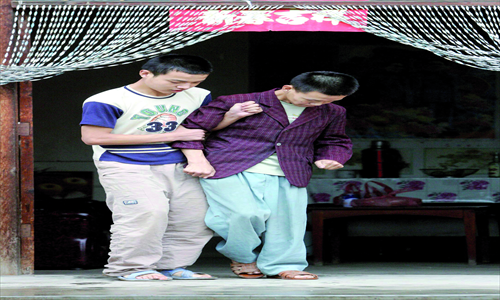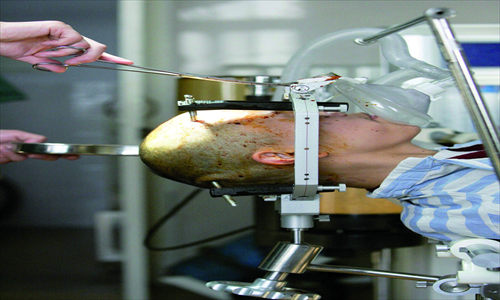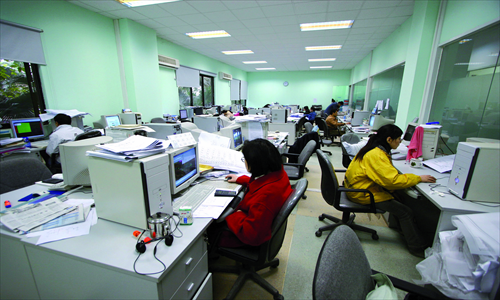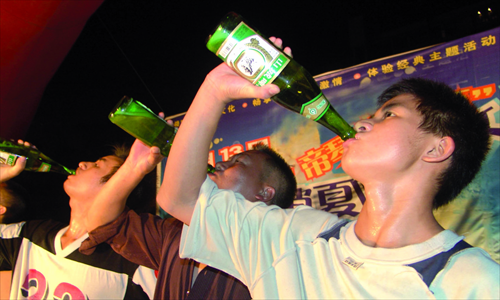Underage




According to statistics revealed by the Chinese Medical Association in April, 15 million people will have Parkinson's disease in China by 2030, which accounts for half of the Parkinson's patients on the planet.
When mentioning Parkinson's disease, a disorder which affects the central nervous system, leading to decreased mobility and eventually death for sufferers, people assume only old people get the disease. There is reason for this. The median age of onset is about 65. Parkinson's disease in someone under the age of 60 is labeled early onset Parkinson's disease and is quite rare. However, recent statistics suggest it is on the rise amongst younger people.
"Over the past seven to 10 years, people in their 40s diagnosed with Parkinson's are becoming common. Cases of Parkinson's patients in their 30s or even 20s can also be seen from time to time," said Zhang Meikui, an expert of Parkinson's disease from the Department of Internal Neurology of Hospital 301 (the General Hospital of the People's Liberation Army).
Why the sudden rise?
Nobody knows exactly why there is an increase in young people getting the disease. One of the main causes for Parkinson's in both older and younger people is genetics. "If one of your family members is diagnosed with Parkinson's then there is a 10 percent chance you will get it too," Zhang said.
On top of genetics though, environmental factors are thought to contribute and this could help explain the increase in the disease at an earlier age. Chen Biao, a Parkinson's disease expert from the Xuanwu Hospital, Beijing, pointed out that the deterioration in some aspects of daily life could be a factor. Young people are now facing more pressure at work. They often overwork and stay up late. "The pressure makes people tense and stress can provoke Parkinson's disease," said Chen. Chen cited the prevalence of Parkinson's in Nazi concentration camps as evidence of the relationship with stress. Chen also gave the example of a 34-year-old businessman from Wenzhou, Zhejiang Province. "He has no family history but as a boss, he overuses his brain daily."
Similarly, Zhang said that many young Parkinson's patients are from the IT field, business and other industries known for stress.
An unhealthy lifestyle in general can contribute and this again might explain the rise amongst the youth. Polluted air, tainted water and poisonous foods all challenge people's health. Specifically, medical research has shown that Parkinson's relates to exposure to the metal manganese, which is found in weed killer, pesticides and untreated stainless steel tableware, amongst other things. As a result, it is unsurprising that more young people are being diagnosed with Parkinson's. They simply live in environments that are more toxic than ever before.
What's more, drinking too much alcohol is a factor. "It's not odd for us to see young people drinking excessive amounts of alcohol to ease the pressures faced today, but alcohol can damage brain nerves," Chen went on.
Keeping the disease at bay
Assuming Parkinson's disease is not in the family tree and therefore beyond people's control to an extent, there are various measures that can be taken to lessen the risks of getting the disease, or lessen the effects once diagnosed.
Focusing on stress management is certainly crucial for young people. "Don't work all the time. Try to relax," Zhang said. Zhang also advised young people to avoid excessive drinking.
It's impossible for people to avoid pesticides or untreated tableware, but the negative effects can be lessened by drinking the traditional Chinese beverage - tea. "As we all know, tea, especially green tea, has many antioxidants, so drinking more green tea will help you," Zhang said. "What's more, sports are also helpful since through exercise, people can metabolize toxic elements out of your body faster," Zhang added.
Zhang also said that young people suffering from high blood pressure, cerebral infarction or arteriosclerosis need to be especially alert and careful, since their current disease may trigger Parkinson's.
Once someone has been diagnosed with Parkinson's, it is hard for it to be cured, but knowing some of the first signs, such as stiffness of the limbs, will help people get treatment at an earlier stage. This will postpone the development of the disease and help people live longer, better lives.
According to Zhang, Traditional Chinese Medicine (TCM) is invaluable. "We prescribe herbs because in TCM theory we believe Parkinson's, as a muscular shaking disease, has something to do with the malfunction of the spleen and kidney," Zhang said. "In addition, we believe that through a combined treatment of TCM and Western medicine, Parkinson's can be controlled."
While the treatment for early onset Parkinson's disease is generally the same as for the elderly, young patients are regarded as a better choice for new surgical techniques and medicines because their bodies are generally stronger.